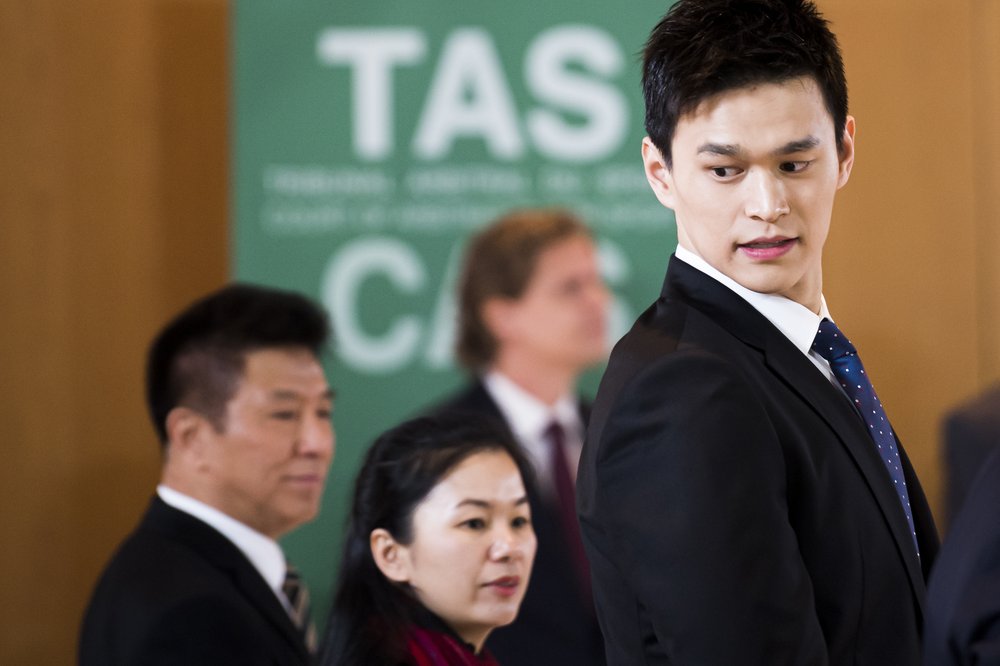
Swimmer Sun Yang, right, from China, arrives for a public hearing at the Court of Arbitration for Sport (CAS) in Montreux, Switzerland, Friday, Nov. 15 2019. One of China’s biggest Olympic stars and three-time gold medalist swimmer Sun Yang is facing a World Anti-Doping Agency appeal in Switzerland that seeks to ban him for up eight years for allegedly refusing to give samples voluntarily. (Jean-Christophe Bott/Keystone via AP)
MONTREUX, Switzerland — A blockbuster doping case got lost in translation with Chinese swimmer Sun Yang on the stand.
Imprecise and incomplete exchanges relayed by courtroom translators into English and Chinese frustrated even Sun’s own lawyers on Friday during his opening statement and cross-examination in the first session of a scheduled 12-hour hearing.
At one point, the three-time Olympic champion’s London-based lawyer, Ian Meakin, apologized for asking his client leading questions “but the translation was so bad.”
In a landmark public hearing — the first in 20 years held in open session by the Court of Arbitration for Sport — Sun could be banned from the 2020 Tokyo Olympics.
The CAS judges are not expected to give a verdict until next year, and it was unclear at times how much of the early questions and testimony were exactly understood.
“My apologies for the poor quality of the interpretation,” judging panel president Franco Frattini said when the hearing resumed after a break.
The court did not select the translators.
The appeal case was brought by the World Anti-Doping Agency. It centers on Sun’s right to refuse cooperation with three anti-doping officials who tried to take blood and urine samples at his home in China last year.
A security guard instructed by Sun’s mother used a hammer to smash a box containing a vial of his blood during a late-night dispute after the swimmer questioned the collection team’s credentials.
Sun detailed how he and his entourage doubted the paperwork and qualifications of officials conducting a properly scheduled mission to get the samples.
“How are you able to trust them?” Sun recalled of a September 2018 incident that escalated into confrontation.
Sun, one of China’s most popular sports stars, said he was not respected by the officials, including a chaperone he said asked to take his photograph.
“This is really ridiculous,” Sun said in translated comments.
When the case was first judged in January, Sun was only cautioned by a tribunal appointed by world swimming body FINA.
Although Sun and his entourage were criticized for their conduct, the first tribunal panel said the sample mission was void and invalid because anti-doping protocol was not followed. Technically, Sun was judged to be not properly notified of needing to give samples.
WADA has asked for a ban of between two and eight years, believing Sun voluntarily refused to submit to give samples.
If WADA’s appeal is upheld, Sun risks a longer sanction because it would be his second offense. He served a three-month ban imposed by Chinese authorities in 2014 after testing positive for a banned stimulant.
That initial ban was quickly addressed by Sun and his legal team on Friday. He said it was a prescribed medication for a heart issue because he sometimes fainted after training.
Translation mishaps complicated matters as lawyers for WADA repeatedly asked Sun if he had learned in his long career of the serious consequences for refusing to give a sample. The 27-year-old athlete repeatedly answered that the lead anti-doping official had not warned him specifically.
Sun’s anti-doping history was detailed, with 180 samples given at competitions and during training from 2012-18. A total of 60 were organized by the Sweden-based firm IDTM, which sent the collection team to Sun’s home.
CAS judge Philippe Sands pressed Sun whether IDTM staff had shown different documents of authorization on the 59 previous occasions he gave samples without problems.
The 2-meter (6-foot, 7-inch) Sun became a star in China as its first man to win an Olympic title in swimming. He won gold medals in the 400- and 1,500-meter freestyle races at the 2012 London Olympics. He added gold in the 200 at the 2016 Rio de Janeiro Olympics.
Sun also has 11 world championship titles and is a polarizing figure in the sport.
He provoked anger among rivals by winning two titles in July while the CAS appeal was pending. Medalists from Australia and Britain refused to stand on the podium with him in Gwangju, South Korea.